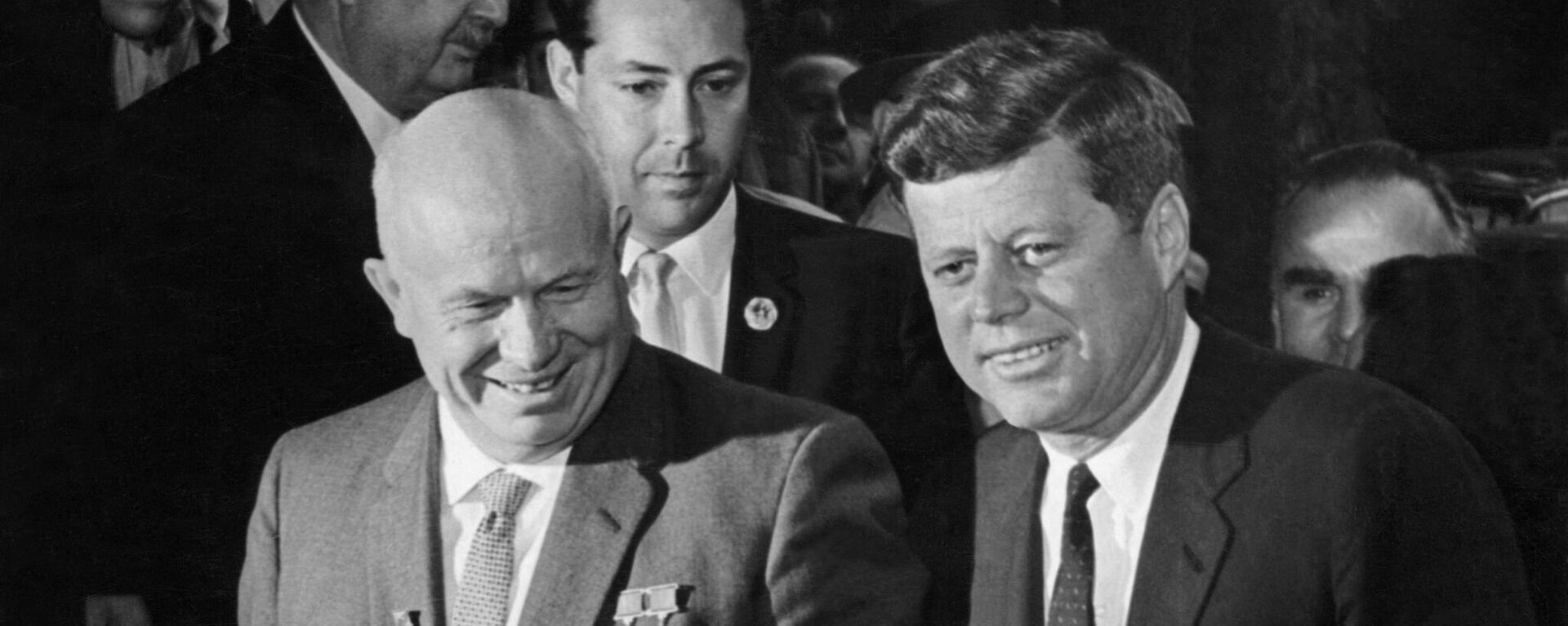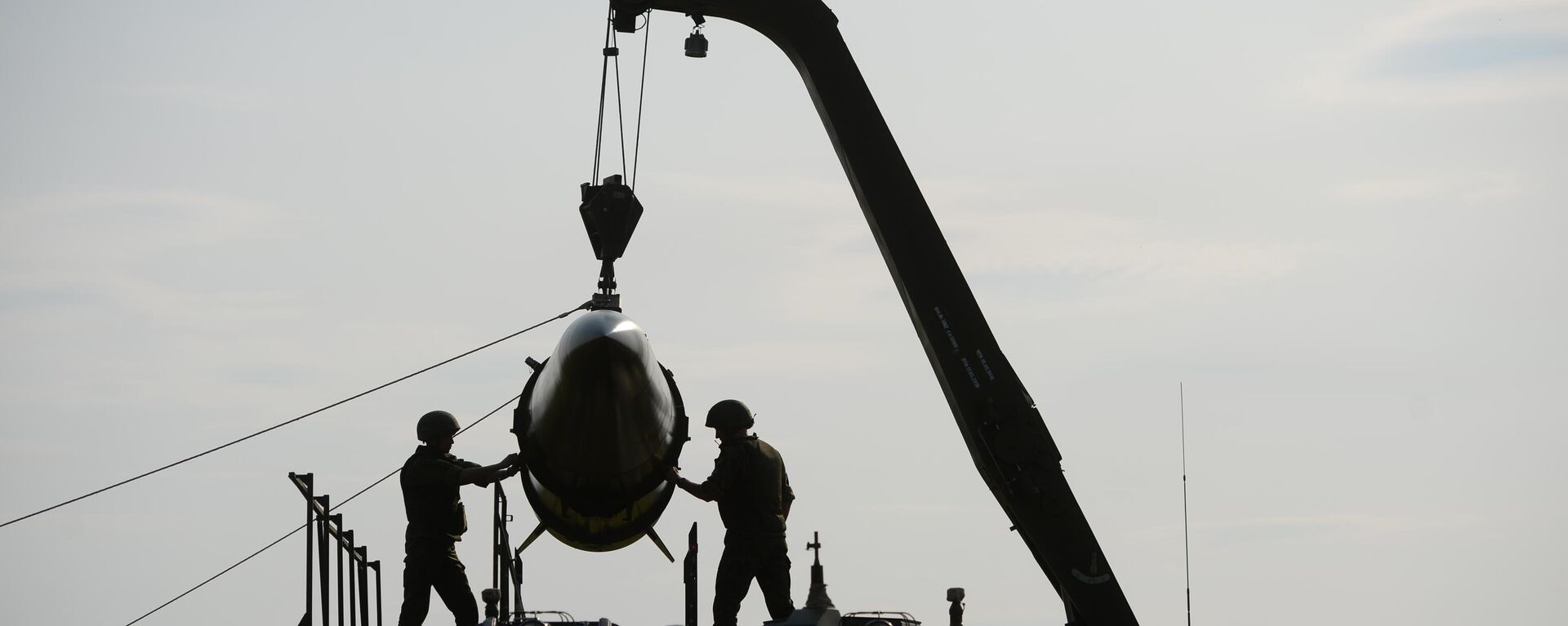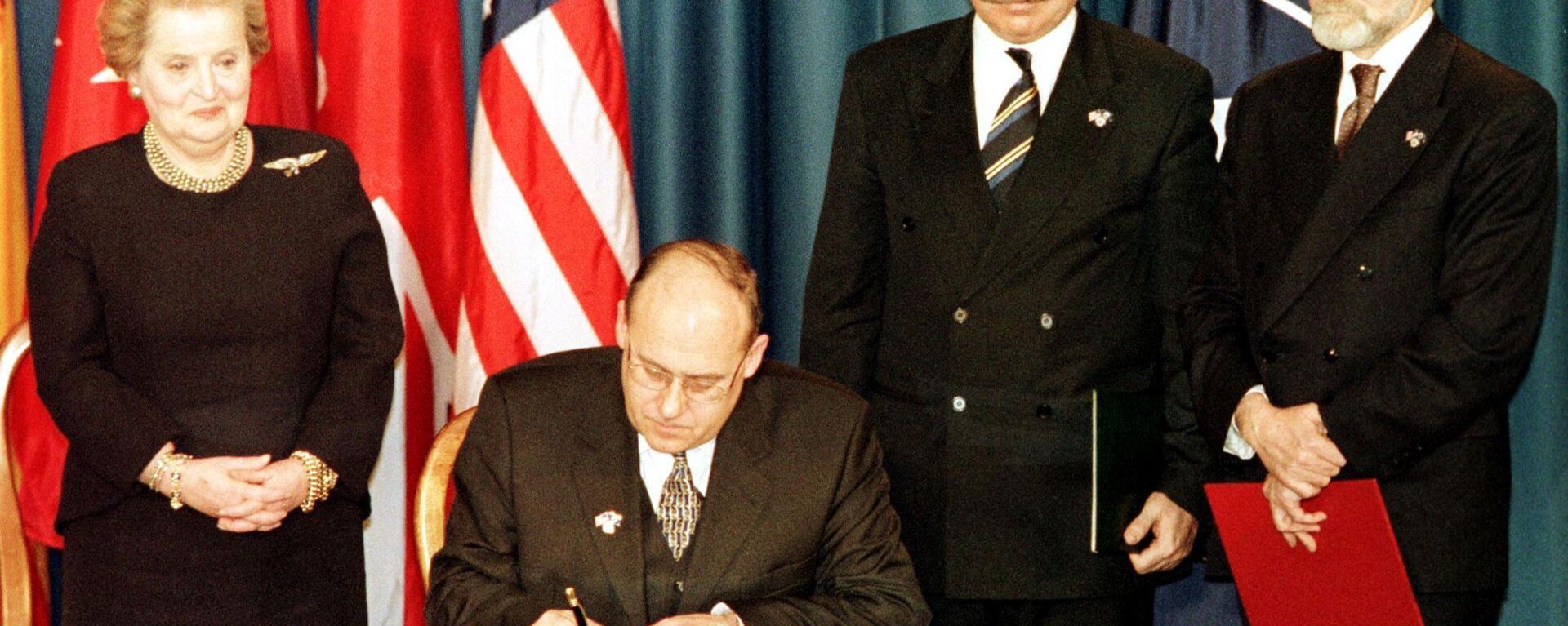https://sputnikglobe.com/20240507/climbing-the-escalation-ladder-french-british-threats-provoke-russian-warning-1118299465.html
Climbing the 'Escalation Ladder': French, British Threats Provoke Russian Warning
Climbing the 'Escalation Ladder': French, British Threats Provoke Russian Warning
Sputnik International
Moscow responded aggressively to claims that Kiev may use British weapons to strike within Russia, claiming such an attack would force the country to target UK military installations in Ukraine and beyond.
2024-05-07T02:30+0000
2024-05-07T02:30+0000
2024-05-07T02:38+0000
analysis
ray mcgovern
john f. kennedy
russia
moscow
ukraine
nato
hypersonic weapons
hypersonic missiles
nuclear warheads
https://cdn1.img.sputnikglobe.com/img/07e7/0c/10/1115629172_0:320:3072:2048_1920x0_80_0_0_a60a0b92201250ae2ccc77eb2a416692.jpg
“While defending our own vital interests, nuclear powers must avert those confrontations which bring an adversary to a choice of either a humiliating retreat or a nuclear war,” said former US President John F. Kennedy during an address at American University in 1963.The remark, coming a few months after the previous year’s Cuban Missile Crisis, demonstrated Kennedy’s newfound sense of restraint in navigating Cold War tensions. The confrontation with the Soviet Union brought the world to the brink of nuclear war with both Washington and Moscow poised to save face by unleashing the deadliest weapons ever conceived by mankind.A repeat of the scenario must be avoided, Kennedy reasoned, with each world power tacitly accepting the other’s existence.Half a century later the slain leader’s realization has been forgotten, claimed former CIA analyst Ray McGovern on Sputnik’s The Critical hour program Monday. The founder of Veteran Intelligence Professionals for Sanity joined hosts Garland Nixon and Wilmer Leon to discuss the latest developments in NATO countries’ proxy war against Russia in the Donbass.“Things are getting pretty intense and the Russians are pretty much saying, ‘okay, that's enough,’” said McGovern, responding to the latest statement from Russian government officials. British Foreign Secretary David Cameron was quoted by media saying Ukraine could use UK-supplied weapons to strike within Russian territory during a visit to Kiev last week.The comment provoked a strong response from Moscow suggesting Russia could target British military assets in Ukraine or elsewhere in response to such an attack on its territory.“We have those reports that [French President Emmanuel] Macron is crazy enough to want to send French troops into battle there in Ukraine, and… the Russians actually have claimed to have killed seven of them this morning,” McGovern added.McGovern claimed Russia’s response could even be nuclear in nature, noting, “the Russians are waving the nuclear possibility as never before. I can say ‘never’ because I've been around a while – would you believe six decades of watching Soviet and then Russian leaders? They don't brandish nuclear weapons. Now they are.”The Russian Ministry of Defense announced Monday they were commencing exercises involving tactical nuclear weapons, suggesting the country could use such armaments if Western nations enable strikes within the country.Russia also possesses hypersonic weapons able to evade traditional defensive systems – a technology not yet developed by any of its Western rivals. McGovern noted the armaments could be equipped with nuclear warheads, but only if Russia is significantly provoked.The stance has predictably caused the US and allies to accuse Moscow of “nuclear saber rattling.” But McGovern claimed the threat is a response to an unprecedented deterioration of relations between Russia and the West, noting recent analysis by Russian historian Dmitri Trenin.“But now the US is doing this by proxy,” he observed. “That's new… We need to rethink this whole thing because this is an existential threat.”The former intelligence analyst warned of the potential consequences if Russia continues to feel it is provoked.“That's the next rung up on the escalation ladder,” he claimed. “I'm afraid that if the French and the British and US don't come to their senses and if Zelensky appeals for NATO troops on the ground that there'll be enough pressure on the part of NATO countries – some of them at least – to comply.”“These threats about nuclear, tactical weapons being mounted for exercises – well, that may be part of this tough approach. But it still worries me greatly because the Russians don't usually do that.”
https://sputnikglobe.com/20221016/cuban-missile-crisis-60-years-on-nuke-risk-higher-today-amid-diplomatic-deficits-1101892889.html
https://sputnikglobe.com/20240506/signal-to-nato-powers-playing-war-in-ukraine-why-russia-is-drilling-its-tactical-nuclear-forces-1118288990.html
https://sputnikglobe.com/20240312/natos-1999-enlargement-sent-clear-signal-to-russia-that-cold-war-never-ended-1117289580.html
russia
moscow
ukraine
united kingdom (uk)
Sputnik International
feedback@sputniknews.com
+74956456601
MIA „Rosiya Segodnya“
2024
John Miles
https://cdn1.img.sputnikglobe.com/img/07e8/01/19/1116388787_0:0:1316:1316_100x100_80_0_0_77e70d36afd983012b1c5d38ddb84156.jpg
John Miles
https://cdn1.img.sputnikglobe.com/img/07e8/01/19/1116388787_0:0:1316:1316_100x100_80_0_0_77e70d36afd983012b1c5d38ddb84156.jpg
News
en_EN
Sputnik International
feedback@sputniknews.com
+74956456601
MIA „Rosiya Segodnya“
Sputnik International
feedback@sputniknews.com
+74956456601
MIA „Rosiya Segodnya“
John Miles
https://cdn1.img.sputnikglobe.com/img/07e8/01/19/1116388787_0:0:1316:1316_100x100_80_0_0_77e70d36afd983012b1c5d38ddb84156.jpg
russia warns uk, russia warns france, russia nuclear warning, russia hypersonic nuclear warheads, russia attack uk bases, russia attack uk military assets, russia attack uk military in cyprus, russia nato escalation ladder, russia existential threat, cold war relations
russia warns uk, russia warns france, russia nuclear warning, russia hypersonic nuclear warheads, russia attack uk bases, russia attack uk military assets, russia attack uk military in cyprus, russia nato escalation ladder, russia existential threat, cold war relations
Climbing the 'Escalation Ladder': French, British Threats Provoke Russian Warning
02:30 GMT 07.05.2024 (Updated: 02:38 GMT 07.05.2024) Moscow responded aggressively to claims that Kiev may use British weapons to strike within Russia, claiming such an attack would force the country to target UK military installations in Ukraine and beyond.
“While defending our own vital interests, nuclear powers must avert those confrontations which bring an adversary to a choice of either a humiliating retreat or a nuclear war,” said former US President John F. Kennedy during an
address at American University in 1963.
The remark, coming a few months after the previous year’s
Cuban Missile Crisis, demonstrated Kennedy’s newfound sense of restraint in navigating Cold War tensions. The confrontation with the Soviet Union brought the world to the brink of nuclear war with both Washington and Moscow poised to save face by unleashing the deadliest weapons ever conceived by mankind.
A repeat of the scenario must be avoided, Kennedy reasoned, with each world power tacitly accepting the other’s existence.
Half a century later the slain leader’s realization has been forgotten, claimed former CIA analyst Ray McGovern on
Sputnik’s The Critical hour program Monday. The founder of Veteran Intelligence Professionals for Sanity joined hosts Garland Nixon and Wilmer Leon to discuss the latest developments in NATO countries’ proxy war against Russia in the Donbass.

16 October 2022, 07:30 GMT
“Things are getting pretty intense and the Russians are pretty much saying, ‘okay, that's enough,’” said McGovern, responding to the latest statement from Russian government officials. British Foreign Secretary David Cameron was quoted by media saying Ukraine could use UK-supplied weapons to strike within Russian territory during a visit to Kiev last week.
The comment provoked a strong response from Moscow suggesting Russia could target British military assets in Ukraine or elsewhere in response to such an attack on its territory.
“We have those reports that [French President Emmanuel] Macron is crazy enough to want to send French troops into battle there in Ukraine, and… the Russians actually have claimed to have killed seven of them this morning,” McGovern added.
“Friends vacationing in Cyprus or other military facilities run by the British, I would tell them to go and sun themselves on some other beach,” he said. “The Russians are speaking pretty tough – tougher than ever before. If one of these British long-range missiles does significant damage in Russia proper there will be retaliation. It will be tit-for-tat, and the Russians will be perspicacious, but they'll be offensive. These will not be defensive measures.”
McGovern claimed Russia’s response could even be nuclear in nature, noting, “the Russians are waving the nuclear possibility as never before. I can say ‘never’ because I've been around a while – would you believe six decades of watching Soviet and then Russian leaders? They don't brandish nuclear weapons. Now they are.”
The Russian Ministry of Defense announced Monday they were commencing
exercises involving tactical nuclear weapons, suggesting the country could use such armaments if Western nations enable strikes within the country.
“The exercise is aimed at maintaining the readiness of personnel and equipment of units for the combat use of non-strategic nuclear weapons in order to unconditionally ensure Russia's territorial integrity and sovereignty in response to provocative statements and threats from Western officials,” read the
statement.
Russia also possesses hypersonic weapons able to evade traditional defensive systems – a technology not yet developed by any of its Western rivals. McGovern noted the armaments could be equipped with nuclear warheads, but only if Russia is significantly provoked.
The stance has predictably caused the US and allies to accuse Moscow of “nuclear saber rattling.” But McGovern claimed the threat is a response to an unprecedented deterioration of relations between Russia and the West, noting recent analysis by Russian historian Dmitri Trenin.
“Russia has experienced an existential threat,” said McGovern. “At all times during the Cold War the notion of inflicting a strategic military defeat on either one was verboten. In other words, when John F. Kennedy said in his wonderful American University speech in '63 we must never, never face a nuclear armed country with a humiliating choice between abject retreat or using nuclear weapons – well, that was honored.”
“But now the US is doing this by proxy,” he observed. “That's new… We need to rethink this whole thing because this is an existential threat.”
The former intelligence analyst warned of the potential consequences if Russia continues to feel it is provoked.
“That's the next rung up on the escalation ladder,” he claimed. “I'm afraid that if the French and the British and US don't come to their senses and if Zelensky appeals for NATO troops on the ground that there'll be enough pressure on the part of NATO countries – some of them at least – to comply.”
“In every other statement Putin says ‘we're ready to talk,’” McGovern claimed. “Now, what does he mean by that? I think he's ready to say, ‘look, you have to recognize that we've won hands down. We could do that before your election in November, Mr. President… or we could postpone it so you don't have to be subject to a great defeat before the election.”
“These threats about nuclear, tactical weapons being mounted for exercises – well, that may be part of this tough approach. But it still worries me greatly because the Russians don't usually do that.”








